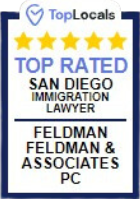Although it is possible to file for a visa or green card without assistance, most intending immigrants utilize a U.S. immigration attorney to help with the process and ensure they are taking the correct steps at the correct times. There are numerous visa categories, and applying in the wrong category or not properly preparing the case can result in a costly denial. Additionally, a knowledgeable lawyer can advise on related immigration legal, such as maintaining your status, changing employers, and/or working and travelling while your case is pending. A San Diego immigration law firm can help you understand complex laws, answer your legal questions, fill out paperwork, and avoid mistakes. An attorney can also ensure that you are treated fairly under the law and have the best chance at obtaining or keeping a visa or green card.
The United States offers a variety of ways to live and work in the country, either temporarily or with the intent to pursue permanent residency and citizenship.
Non-immigrant visas include:
- Work Visas
- Travel Visas
- Investor Visas
- Family Visas
- Exchange Visas
- Student Visas
There are a number of different avenues to obtaining permanent residency in the United States, including:
- Family-based
- Employment-based
- Investment
- Refugee
- The annual diversity lottery.
Different avenues to green cards are appropriate for different people. If you have close relatives in the United States already, family-based may be your best option. If you have special skills or an extraordinary ability, an employment-based visa may be best. If you have a significant amount of money to invest in a project, you may consider investment immigration.
To become a U.S. citizen, you must first obtain permanent residency for a number of years. Securing citizenship involves learning to speak, read, and write in English; learning American history; and proving that you will be a contributing and moral addition to the country. If you are married to a United States citizen, then you only have to wait 3 years instead of the usual 5 years to become a citizen.
If you have overstayed your visa, you should immediately contact an attorney for assistance. Overstaying your visa means that you are in the country illegally and it may harm your chances of securing a green card or permanent residency. If your visa is about to expire, you may be able to ask for an extension. An immigration attorney can listen to the particulars of your case and help you understand your best options for action under the law.
If you or a family member is facing a deportation hearing, you may benefit from the assistance of a deportation attorney. At Feldman Feldman & Associates, we can analyze your case and navigate the legal process surrounding deportation. We are here so that you will understand your rights, so that you will have the best chance to remain in the country, and so that you will get the best outcome possible under the law.
Marriage to a U.S. Citizen and other family based categories
If you are a U.S. Citizen and married to a foreign national then you can sponsor your spouse for permanent residency. If your spouse is in the U.S. you can petition for them through a process called Adjustment of Status. This involves filing several forms and various supporting documents with USCIS. If your spouse is overseas, then they will file form I-130 with USCIS, but after this is approved they will need to attend an interview and obtain an immigrant visa at the consulate.
If you are not yet married, there is also the option to bring your fiancé to the U.S. on a K-1 fiancé visa. The K-1 fiancé visa will be valid for 90 days, and you must get married before the visa expires.
If you are a U.S. citizen who is married to a foreign national, your spouse must hold a green card for a minimum of two years and 9 months before he or she will be eligible to apply for U.S. citizenship.
EB-5 investor visas
There are three primary requirements to obtain an EB-5 investor visa: (i) the minimum investment requirement, (ii) the business requirement, and (iii) the job creation requirement. In most cases, the minimum investment is $1,000,000 (there are exceptions for investments in rural areas or areas with high unemployment- most Regional Centers are located in areas that qualify for the reduced investment amount of $500,000). The investment must be in an active, for-profit commercial business established after November 29, 1990, and it must result (either directly or indirectly) in the creation of at least ten new jobs for U.S. workers within the first two years. If you invest in a “troubled business,” you can satisfy the job-related requirement by preserving (as opposed to creating) at least ten positions.
EB-2 and EB-3 Labor Certification
The Labor Certification process enables an employer to sponsor a foreign national for permanent residency.
EB-2 employment-based visas are available to foreign nationals who hold an advanced degree (or its equivalent) and those who have “exceptional ability.” USCIS considers a Bachelor’s degree plus five years of progressive work experience in the field in which you are applying for a job to be the equivalent of an advanced degree, and “exceptional ability” requires proof of “expertise significantly above that ordinarily encountered in the sciences, arts, or business.”
EB-3 employment-based visas are available to foreign nationals who fall into any of the following three categories: (i) “skilled workers” seeking permanent employment and with at least two years of training or work experience, (ii) “professionals” seeking employment requiring at least the equivalent of a U.S. Bachelor’s degree, or (iii) “other workers” seeking permanent employment in unskilled labor positions.
EB-2 National Interest Waivers
The National Interest Waiver (NIW) allows foreign nationals who are eligible for an EB-2 employment-based visa to bypass the requirements of labor certification and having a permanent job offer and employer sponsor in the United States. Obtaining a National Interest Waiver involves satisfying a number of requirements, including supplying proof that it is in the interests of the United States for you to receive your visa promptly because your work will benefit the nation to a greater extent than the work of others in your field.
EB-1 Extraordinary Ability
The EB-1 Extraordinary Ability category is available to individuals who have been recognized for their accomplishments in the arts, sciences, business, education, or athletics. You do not need labor certification or an employer sponsor to obtain permanent residency based upon extraordinary ability. However, you do need to be able to demonstrate that you have received acclaim for your accomplishments, that you will continue to work in your field in the United States, and that your continued work will benefit the nation.
For those who do not have a single lifetime achievement such as a Pulitzer or Nobel Prize, demonstrating acclaim generally requires satisfying 3 out of 10 requirements, such as winning awards, media recognition, evidence of thought leadership, publications or exhibitions, financial or commercial success, or significant contributions to your field.
EB-1 Multinational Managers
If you have been employed outside of the United States in a managerial or executive capacity for at least one year out of the last three, then a qualifying U.S. parent, subsidiary, or affiliate of your foreign employer can petition for you to be transferred permanently to the U.S. as a “multinational manager.”
EB-1 Outstanding Researchers
In order to qualify as an “outstanding researcher,” you must demonstrate that you have garnered international recognition based upon outstanding achievements in your academic field. You must also have at least three years of teaching or research experience in your field, and you must be seeking to enter the United States in order to accept an offer for employment in a tenure-track professor position or comparable research position at a higher-education or research institution. You must also be able to provide documentation demonstrating your academic recognition, such as a major prize, scholarly publication, or evidence of an original academic or scientific contribution.
L-1a and L-1b intra-company transfer visas
The L-1 intra-company transfer visa is a non-immigrant visa that allows individuals employed by foreign companies to work in the United States on a temporary basis. Foreign nationals who are eligible to obtain L-1 visas include executives, managers, and employees with specialized knowledge who will work for a U.S. company affiliated with their overseas employer. Managers and Executives apply for an L-1a and are eligible for a total of 7 years on L-1a status. Individuals with specialized knowledge apply for an L-1b and are limited to a total of 5 years on L-1b status.
L-1 intra-company transfer visas are only available to workers who meet the qualification requirements. However, family members are eligible to apply for L-2 visas, and spouses can apply for Employment Authorization Cards (also known as “open-market work permits”) upon arriving in the United States.
E-2 Investor visas
The E-2 investor visa is available to foreign nationals who are citizens of any of the United States’ 75 treaty countries around the world. Unlike the EB-5 investor visa, the E-2 investor visa is a temporary visa, but it is renewable indefinitely. The E-2 visa does not have a specific minimum investment requirement, but the investment must be substantial and sufficient to sustain the business’s operations. The required investment will vary depending on the type and size of the business, but should generally be at least $75,000. The business must be operational, and you must have responsibility for developing and directing the business while you are in the United States.
H-1b specialty occupation visas
In order to qualify for an H-1b specialty occupation visa, you must hold a Bachelor’s degree or its equivalent and work in a field that requires the application of highly-specialized knowledge. Examples of qualifying fields include accounting, architecture, computer programming, engineering, and medicine.
Generally speaking, H-1b specialty occupation visas are valid for three years and can be renewed for one additional three-year period. However, you can renew your H-1b indefinitely if you have an approved petition for alien worker (Form I-140) or if a labor certification has been pending for over a year.
The spouse and children of an H-1b visa holder can obtain an H-4 dependent visa. Generally, the spouse on H-4 status cannot work, unless the H-1b visa holding spouse has an approved I-140.
TN visas for Canadians and Mexicans
TN classification allows Canadian and Mexican citizens who work in certain professions to enter the United States on a temporary basis. Examples of qualifying professions include accounting, engineering, law, pharmacy, science, and management consultants. You must have a prearranged job with a U.S. employer for a position that requires a qualifying professional, and you must have the necessary qualifications to practice in your profession.
The categories and criteria are the same for Canadians and Mexicans to obtain a TN visa, but Mexicans need to complete a DS-160 and obtain a TN visa from a consulate (or apply to change status with USCIS) prior to entering the U.S. While Canadians can simply present the requisite documents and apply for a TN visa at the Port of Entry.
O-1 visas for people with extraordinary ability
In order to qualify for an O-1 visa, you must demonstrate that you are at the top of your field. Moreover, USCIS has enumerated certain criteria that one must satisfy. This can be done through a one-time extraordinary achievement or by satisfying 3 out of 8 possible criteria.
P-1 visas for athletes and actors
If you are intending to travel to the United States to compete in an internationally-recognized competition, you will need to obtain a P-1A visa. The P-1A visa is required for both team and individual events.
A P-1B visa is required if you will be performing in the United States as a member of an internationally-recognized entertainment group. If you are traveling individually, you are not eligible for a P-1B visa and would typically apply under the O-1 category.
Other types of Employment visas and work visas
Under the U.S. immigration system, there are many different types of employment and work-related visas that are available to foreign nationals. In addition to those discussed above, some of the visas available to individuals seeking temporary employment in the United States include: (i) J-1 trainee and exchange visitors, (ii) B visas for visitors, (iii) H-2A and H-2B visas for agricultural and non-agricultural workers, (iv) F-1 and M-1 visas for students and (v) U visas for crime victims.
Lynne Feldman has practiced immigration law for over 35 years, has written articles for books, and has taught as a professor of law at the University of Illinois. The other attorneys at Feldman Feldman & Associates all focus on immigration law and spend countless hours ensuring that everyone in our office is up to date on the latest law changes and policy memoranda.
The tireless attention to detail and the high quality of service that Feldman Feldman & Associates provides ensures that all cases are handled properly and that no one slips through the cracks. We believe that every case is important. All emails and phone calls are answered promptly and we provide periodic updates on all cases. Finally, we charge reasonable flat fees so that clients can rest assured that there are no hidden surprises.
Have Another Question for Our Immigration Attorneys?
If you have a specific question about your personal legal situation, call Feldman Feldman & Associates today to speak with an attorney.
CLIENT TESTIMONIALS







